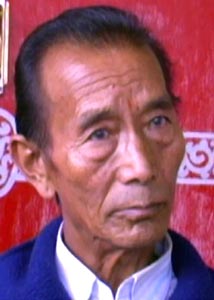Name: Kalsang
(Alias: Yes)
Gender: Male
Interview Age: 65
Date of Birth: 1942
Birthplace: Tharpa, Utsang, Tibet
Year Left Tibet: 1971
Profession: Monk
Monk/Nun: Previously
Political Prisoner: Yes

Interview No.: 38
Date: 2007-06-28
Language: Tibetan
Location: Lugsung Samdupling Settlement, Bylakuppe, Karnataka, India
Categories: Oppression and Imprisonment
Keywords: brutality/torture, Chinese -- oppression under, Chinese rule -- life under, escape experiences, forced labor, monastic life, refugee in India -- life as, thamzing/struggle sessions, Utsang
Summary:
Kalsang became a monk at the early age of 5 and lived at the monastery until he was 17 and forced to leave. In 1959 the Chinese closed the monastery and ordered the monks to return to their families. Kalsang's family, who were well-off, became targets of the Chinese. He and his family were tortured and humiliated in struggle sessions instigated by the Chinese. They were forced to state "that China was very good, that the Tibetan society was bad and that we were very happy under the Chinese government."
Kalsang was required to work in the fields and all the harvests were taken by the Chinese, who gave the workers an insufficient grain ration that often left them hungry. Kalsang's father was arrested and died after eight years in prison.
Later Kalsang learned that he too would be arrested so he decided to flee. He was unsure of how to proceed and he hid for 18 months in a small space underneath a friend's house, only emerging occasionally under the cover of darkness. Eventually his friends were able to find someone to show Kalsang the way to Bhutan.
Interview Team:
- Martin Newman (Interviewer)
- Lhakpa Tsering (Interpreter)
- Tsewang Dorjee (Videographer)

